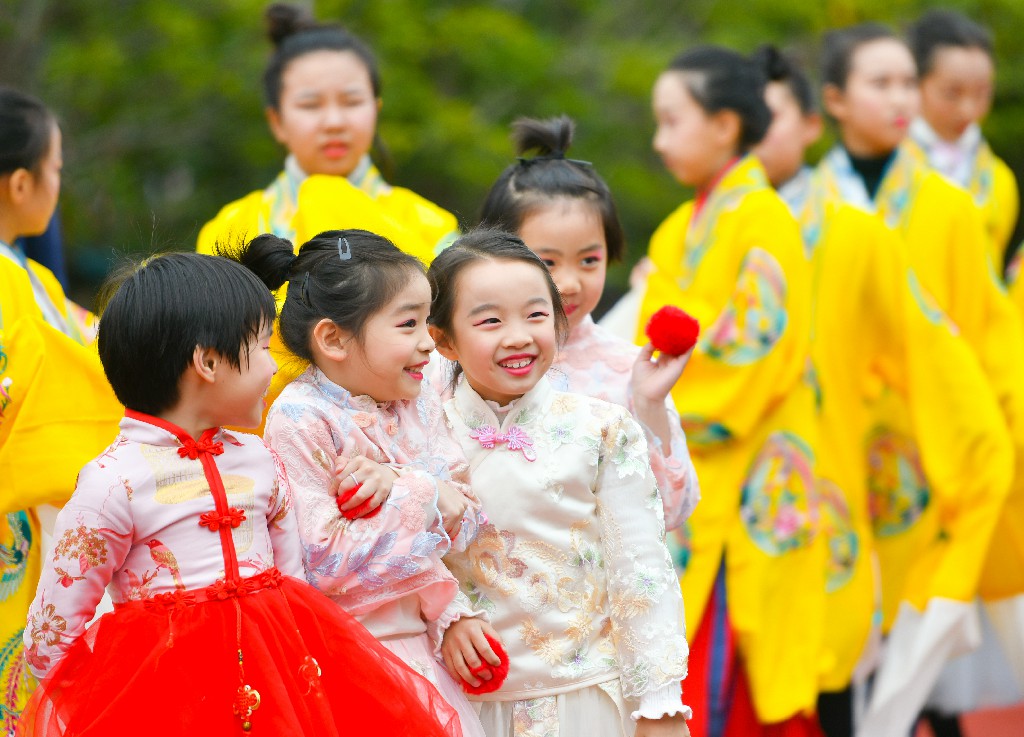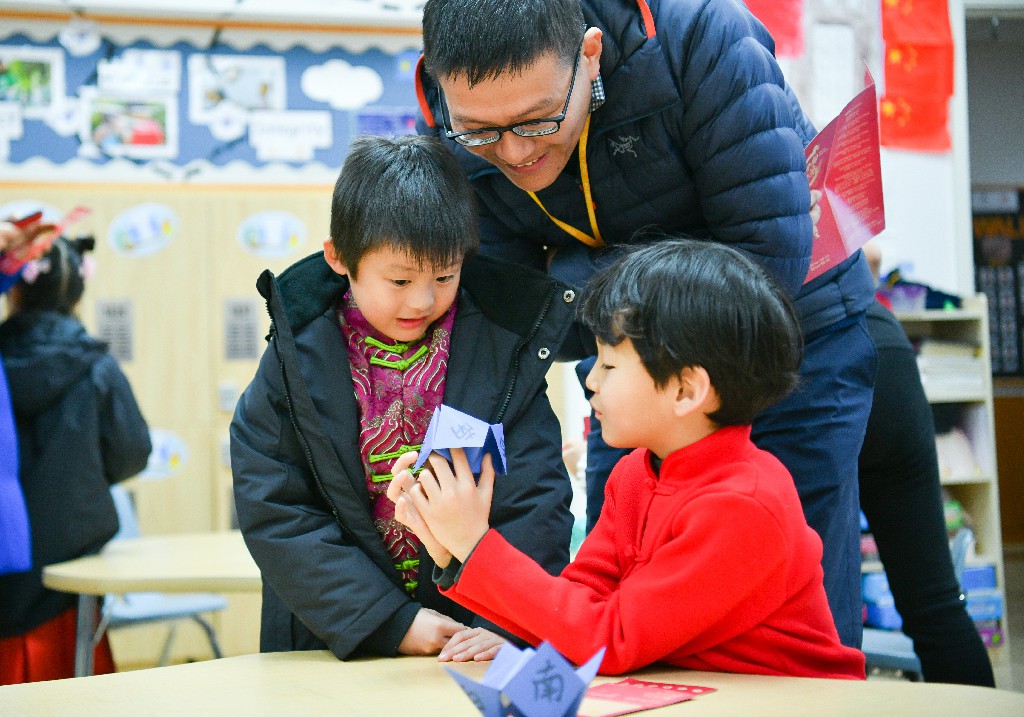
In the memory of adults, celebrating Spring Festival is so unforgettable that the flavour of Laba congee and rice cakes, as well as the sound of firecrackers, comes to their mind immediately whenever the festive season comes around. However, we gradually find that the atmosphere of celebrating the most important festival of the year is not as jubilant as before and our memories tend to fade away. Therefore, when the Year of the Rat comes, we intend to look for the atmosphere of Spring Festival in an abundance of festive activities here at Hiba Academy Shanghai.

Traditional Chinese New Year atmosphere Pupils tried out many different activities on our celebration day, such as writing couplets, cutting window decorations, pasting Fu-characters and creating new year paintings. Walking around the campus, you will discover the beautifully decorated classroom gates and unique New Year pictures designed by our pupils. Since most of the decorations are in an eye-catching red colour, Hiba School has been filled with a truly festive atmosphere, ready to welcome the Year of the Rat.


Celebrating the Spring Festival could not be done without some spectacular performances, which consisted of multiple classical artforms. Different kinds of performances kicked off our Chinese New Year celebration activities, including drum beating, lion dancing, some Chinese zither performances and even opera. A huge Hiba scroll painted by pupil representatives of the four houses was opened slowly, representing how Hiba pupils and teachers will make concerted efforts to achieve higher goals in the coming year.
 The lantern riddles activity was an appropriate demonstration of Hiba pupils’ wisdom and cleverness. Even though these riddles related to knowledge of different fields, pupils still were confident enough to solve them one by one, which excited them and gave them a satisfying sense of achievement.
The lantern riddles activity was an appropriate demonstration of Hiba pupils’ wisdom and cleverness. Even though these riddles related to knowledge of different fields, pupils still were confident enough to solve them one by one, which excited them and gave them a satisfying sense of achievement.

The handicrafts fair was another exciting event that attracted a lot of attention. By utilising common materials on hand, dough figurine artists made a lively monkey king in such a short space of time. Nearby, papercutting artists deftly cut silhouettes of pupils’ faces with plain paper and scissors.

Next to them, the sugar figurine stall was crowded with pupils who waited in a queue to receive their favourite ones. Pupils, dressed in traditional clothes, walked around the handicrafts stalls as if they were in the ancient streets of a bygone era of China’s history.

Preparing various traditional food is another important element of Spring Festival. Pupils learned to make these delicacies by themselves, experiencing the delight of enjoying their handiwork and tasting delicious food as well. They did their utmost to imitate the amazing dumplings and sweet dumplings made by the adult experts, and it was a warm and festive scene to see the whole Hiba family gather together to make such special food. Experiencing traditional six arts We not only look back on the past year, we also look ahead to the coming year. Whether traditional or modern, we want to pass down an appreciation of China’s classic artforms. We expect that Hiba pupils will be able to carry forward our culture as well as demonstrate it in new and creative ways.

The ‘Six Arts’, which consist of rites, music, archery, charioteering, calligraphy and mathematics, were actively promoted by Confucius over two thousand years ago. This principle matches with our educational philosophy of being holistic in modern society. Accordingly, during this Spring Festival celebration, we took our pupils to embark on a cultural journey centred around the Six Arts.

“Is this dragon embroidery hand-sewn?” ”Wow, this is the most beautiful costume I have ever seen.” Beside the stage, pupils were duly impressed by the delicate Peking opera costumes.

When pupils got a close look at the Peking opera on display, they all marvelled at its beauty. On the stage, performers were singing songs excerpted from famous plays. Their sounds, gestures and demonstrations were woven together in an intricate and mesmerising fashion. The expression in their eyes and hand movements, accompanied by melodious singing, demonstrated their excellent skills to the watching pupils. Off stage, pupils had the chance to try on the costumes. Looking at themselves in the mirror, they were surprised to see the dramatic change, as their eyes were as clear as water and their eyebrows were as willow-leaves. Their peers were also impressed by their dress and admired them deeply. We believe that the Peking opera show planted a seed of interest and excitement in pupils’ hearts, which hopefully will sprout and grow larger in their performing arts classes. At the calligraphy corner, teachers put a red-wine mark on the forehead of pupils by using the zinnober, representing their blessing to pupils while giving them edification. Pupils, donning Chinese Han clothing, beat the red drums, whose sonorous sound made present people feel encouraged and enthused. With the help of teachers, pupils tried their best to write calligraphy as if they were skilful calligraphers. We hope that the Fu characters wrote by them will bring the whole Hiba community good fortune in the coming year. Joy and Blessings On the other side of the venue, pupils were experiencing the classic ancient pitch-pot game. Onlookers cheered for them whenever they threw an arrow right into the pot.

Behind this group, a pupil held the halter, as they experienced the simulated horse-riding game. Although pupils could not actually gallop or shoot arrows due to the limited space, they still had the chance to show their academic and sporting talents through these interesting and captivating games.

These recreation activities held in every corner of the campus reminded us of our precious childhood memories. Many parents remembered how they played with their friends when seeing the games of ‘scratching cards’ and ‘Chinese folding game’.

Surrounded by numerous traditional recreation activities, namely, cutting window decorations, picking up marbles with chopsticks, Kongming lock and passing the parcel, it was clear that all the pupils were having a great time.
 The house classrooms on the third and fourth floor also attracted many visitors. With the concerted efforts of house parents, pupils and teachers, the rooms were decorated with many festive gadgets based on the respective house colours. It also demonstrated diverse traditional cultures collected from different parts of China.
The house classrooms on the third and fourth floor also attracted many visitors. With the concerted efforts of house parents, pupils and teachers, the rooms were decorated with many festive gadgets based on the respective house colours. It also demonstrated diverse traditional cultures collected from different parts of China.
 First-hand experiences enable our pupils to find out charm and profoundness of Chinese cultures. Then, they will naturally appreciate it and should the responsibility to pass down it. This is not only a requirement set by Hiba curriculum, but also an earnest expectation of Hiba parents.
First-hand experiences enable our pupils to find out charm and profoundness of Chinese cultures. Then, they will naturally appreciate it and should the responsibility to pass down it. This is not only a requirement set by Hiba curriculum, but also an earnest expectation of Hiba parents.

The New Year’s gift designed by Friends of Hiba also conveys the message that what kind of people that they expect their children grow to be. All in all, we hope that every Hiba pupil, with the quality of modesty and inclusiveness, is determined to carry forward